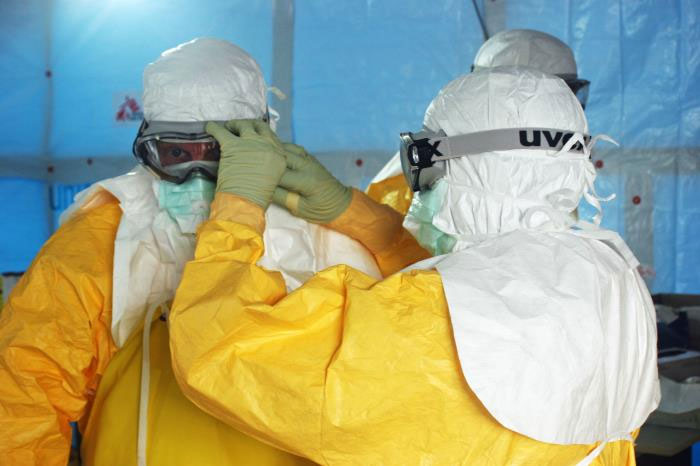
Ebola is spreading rapidly in West Africa, and the first cases of people in the United States who have the deadly virus have been reported. Now, Americans are getting increasingly jittery about importing the deadly disease, new polls show.
In a recent Washington Post and ABC news poll, 67 percent of those surveyed said they supported a travel ban from the affected countries.
But despite broad popular support for such restrictions, travel bans would actually increase the risk of the disease spreading to other countries, including the United States, experts say.
Here's why: A travel ban would reduce the number of medical workers who enter the countries, which could worsen the outbreak there, said Dr. William Schaffner, a professor of preventive medicine and infectious diseases at Vanderbilt University Medical Center in Nashville, Tennessee. The countries of Guinea, Liberia and Sierra Leone already had fragile health infrastructures, and many of their doctors and nurses have died from the disease, he said.
Further depriving those nations of U.S. medical workers would thus mean more Ebola cases there. And an increase in the number of cases anywhere in the world means there is an increase in the risk that someone with Ebola could come to the United States, said Dr. Amesh Adalja, an infectious disease specialist and a representative of the Infectious Disease Society of America.
Travel bans would also severely impact a targeted country's economy, leading to food and water shortages and political destabilization, Adalja said.
People may flee the affected countries and cross, undetected, into neighboring nations such as Mali or the Ivory Coast, Adalja said. (On Thursday, Oct. 23, Mali confirmed its first case of Ebola, in a 2-year-old girl who had crossed the border from Guinea.)
Sign up for the Live Science daily newsletter now
Get the world’s most fascinating discoveries delivered straight to your inbox.
"What a travel ban does is it squeezes people to use other modes of transportation," Adalja told Live Science.
And people fleeing from Liberia, Guinea or Sierra Leone who were banned from flying to the United States could instead fly to other countries in Africa, which would mean the United States would then either have to ban travel from even more countries, or cast a much wider net in monitoring than it currently does, he said.
Right now, American airports funnel the approximately 150 passengers a day from Guinea, Liberia and Sierra Leone through five main ports of entry. Those coming from Ebola-ravaged countries must check in with public health authorities, take their temperatures for 21 days (the incubation period for the virus) and be on the alert for symptoms.
Under this system, public health officials can keep tabs on every person who comes down with the disease, and get them isolated and into a designated care facility before they are highly infectious. But this effort would be difficult to scale up if many more African countries had outbreaks flaring, Adalja said.
An endemic disease?
People in the United States may not want to risk American lives at home simply to help the humanitarian effort in Africa. But if the outbreak in Africa gets large enough, there's a risk that Ebola could become an endemic disease in the region, meaning there will always be cases present in some populations there, said Dr. Howard Markel, a pediatrician and the director of the Center for the History of Medicine at the University of Michigan.
That possibility was also highlighted earlier this month in a news conference held by the Centers for Disease Control and Prevention. [The 9 Deadliest Viruses on Earth]
"It could spread to other countries in Africa and be an ongoing risk that we would have to deal with for months or for years," Dr. Thomas Frieden, the director of the CDC, said. "It's really important that we stop the outbreak. And to do that, we need regular travel. We need countries not completely isolated from the world."
The outbreak in West Africa is now the worst Ebola outbreak in history, with nearly 10,000 cases and almost 5,000 reported deaths as of Oct. 22, according to the CDC.
Future use?
The Obama administration hasn't ruled out the possibility of a travel ban if the situation continues to worsen. In September, a CDC report projected that up to 1.4 million people could be stricken by Ebola in Guinea, Sierra Leone and Liberia if relief efforts aren't dramatically scaled up. At that point, a travel ban could be potentially useful, although even then it still may not make sense, Markel said.
So far, Ebola has stricken fewer than about 10,000 individuals in countries with millions of people, and only two of the thousands of passengers who have traveled recently to the United States from West Africa have tested positive for the disease after they arrived here, Markel said.
"Don't use a bazooka when a BB gun will do," Markel said. "A travel ban is a bazooka."
The risk to Americans is ultimately tied to the size of the outbreak in West Africa, all the experts said, so the best way to keep people in the United States safe is to stamp the disease out at the source.
"Until the outbreak is gone, everybody is going to be at risk," Adalja said.
Follow Tia Ghose on Twitter and Google+. Follow Live Science @livescience, Facebook & Google+. Originally published on Live Science.

Tia is the managing editor and was previously a senior writer for Live Science. Her work has appeared in Scientific American, Wired.com and other outlets. She holds a master's degree in bioengineering from the University of Washington, a graduate certificate in science writing from UC Santa Cruz and a bachelor's degree in mechanical engineering from the University of Texas at Austin. Tia was part of a team at the Milwaukee Journal Sentinel that published the Empty Cradles series on preterm births, which won multiple awards, including the 2012 Casey Medal for Meritorious Journalism.









